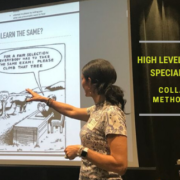Standardized Testing: Teacher Tips
The wise Benjamin Franklin once said that two things in life are guaranteed—death and taxes. Educators in the public school system would likely vote to add standardized testing to that list of guarantees. Few things dichotomize the staff lounge like the discussion surrounding the use of high-stakes tests. While both sides of the long-held debate argue vehemently for the continued use or abolishment of said standardized assessments, one thing is certain—our students, teachers, administrators, and schools will be measured by standardized tests.
With such an inevitable, and potentially stressful, certainty looming over the heads of our students, one major concern for teachers is how to alleviate test anxiety. Here are a few tips:
- Provide your students with test-taking strategies prior to the discussion of a major assessment. Students are likely to feel at ease when they are armed with copious strategies for tackling test questions. Prep students in advance so that the strategies are less “teaching to the test” and taught more as essential academic skills for success in higher education.
- Another valuable test-taking skill for all content areas involves note-taking. Strategic note-taking is not an innate skill—it must be introduced and practiced in order to master the practice successfully. Make sure that students know how to abbreviate, condense, and paraphrase main ideas and concepts. As many different strategies as there are for taking notes, there are wrong ways to do it, as well. Teaching what not to do when taking class notes can also be beneficial for students. There is no need to copy notes word-for-word; spend the time absorbing and noting new information.
- Provide support for practicing time management skills. This could mean allowing study sessions during class, creating a realistic study schedule or calendar, or making creative outlines and checklists for larger unit tests. Also, encourage students to space out their studying and reviewing over several days. A study log is another beneficial way to ensure that students are accountable for their own preparation before a large assessment. Taking several small breaks during a study session can help with attention span, as well.
- Encourage students to reread directions and seek clarification if the directions or questions are creating confusion. Guessing, stressing, or spending too much time on complicated instructions can increase test anxiety. Similarly, encourage students to skip questions that are confusing. Remind them that they can always go back and select an answer later on in the testing session. But to focus on a confusing question for too long will not only waste time, it will cause frustration and stress.
- Reading the questions prior to the excerpt is also a method to save time. When students know what they are looking for, they are able to work through the text or excerpt more efficiently. Also, remind students to read each question carefully, being sure to understand what is being asked before seeking the answer. Often times, in an effort to save time, students may rush through the questions and choose the initial gut response. Remind them to read questions carefully and completely.
- Lastly, when in doubt, remind students to use the “process of elimination” method. Especially when questions are more confusing than others, encourage them to cross off answer options that they know cannot be correct. Then, when necessary, take an educated guess of the remaining options.
When it comes to standardized tests, forewarned is forearmed. Introduce your students to these helpful tips and give them the advantage at test time.








